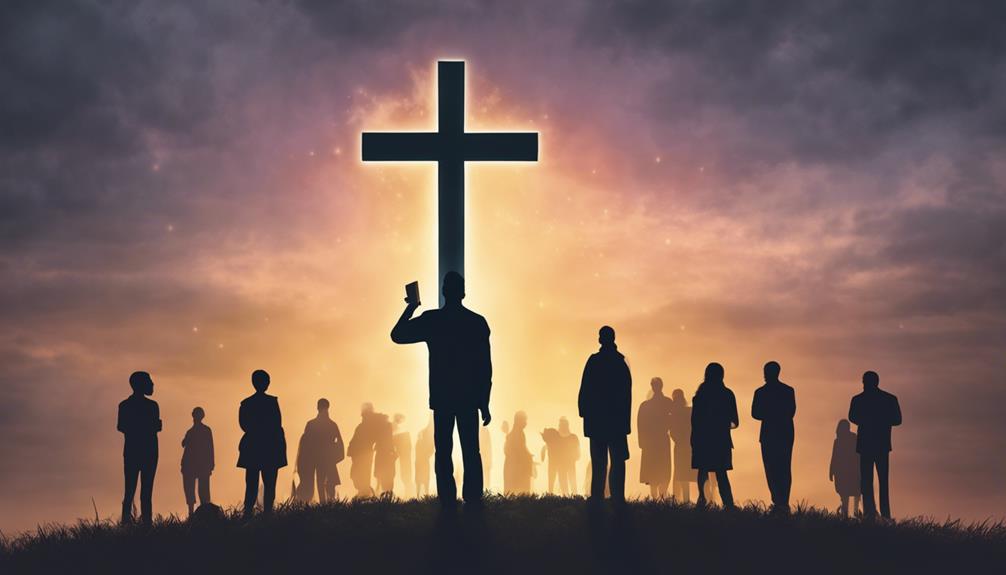Kneel into the profound role of witnessing in the Bible, where it transcends mere observation and beckons a deeper, transformative spiritual journey.

What Does Witness Mean in the Bible
In the Bible, being a witness doesn't mean you're stuck in an endless courtroom drama, yet the concept is more pivotal than you might think. As you explore the scriptures, you'll discover that witnessing goes beyond mere observation; it's about profound transformation and advocacy.
From historical figures who bore witness to God's deeds, to the early church's members spreading the gospel, the role is rich with significance. If you're curious about how this ancient duty impacts your personal spiritual journey and influences the broader Christian mission, there's much to uncover that could reshape your understanding and practice of faith.
Key Takeaways
- Witnessing in the Bible involves affirming truth in both legal and spiritual realms, enriching narratives with human and divine interactions.
- Prophets and early Christians exemplified witnessing by declaring God's message and inviting participation in His salvation plan.
- Being a witness affects personal beliefs and actions, demanding integrity, commitment to truth, and ethical responsibility.
- Witnessing serves as a catalyst for change, emphasizing service, justice, and the authentic representation of one's faith.
Biblical Definitions of Witness
In the Bible, 'witness' encompasses a range of meanings, each deeply rooted in historical, theological, and moral contexts. You'll find that at its core, the concept serves two primary functions: legal testimony and divine revelation. These facets aren't mutually exclusive but rather weave together to provide a comprehensive understanding of how 'witness' operates within biblical narratives.
When considering legal testimony, you're delving into the judicial use of witness, which is prevalent in both the Old and New Testaments. This aspect emphasizes the importance of truthful testimony in legal proceedings, underpinning the value of integrity and truth in the community's social and moral fabric. It's a concrete application, where individuals bear witness to events, actions, or characters, serving as a foundation for justice and order.
On the other hand, divine revelation represents a more ethereal dimension of 'witness'. This aspect transcends the mere reporting of facts or events. Instead, it involves a spiritual or revelatory witnessing, where individuals or groups testify to the works, character, and promises of God. This form of witness is pivotal in the dissemination and affirmation of faith, offering believers a framework through which divine truths are recognized and embraced.
Analyzing 'witness' through these lenses—legal testimony and divine revelation—provides a nuanced understanding of its significance. It's not just about observing or reporting; it's about affirming truth, whether in a courtroom or in the realm of faith. This dual application enriches the biblical narrative, offering layers of meaning that reflect the complex interplay between human experience and divine interaction.
Historical Witnesses in Scripture
Exploring the concept of 'witness' further, we encounter historical witnesses in Scripture who embody both the legal and divine dimensions previously outlined, offering vivid accounts that shape our understanding of biblical truth. These figures, through their lives and records, serve as pivotal connectors to the divine narrative, weaving a fabric of faith and testimony across generations.
Historical witnesses in Scripture aren't mere narrators; they're integral to the unfolding of God's plan. Their accounts go beyond personal testimonies, embedding themselves into the collective memory of faith communities. Martyrdom accounts, for instance, offer profound insights into the depth of faith and commitment to divine truth. These narratives don't just recount events; they testify to the power of belief and the cost of discipleship. Similarly, genealogical records in the Bible serve as more than historical or familial documentation. They're testimonies to God's faithfulness, tracing the lineage of divine promise through generations.
- Martyrdom accounts evoke a deep sense of sacrifice and devotion.
- Genealogical records underscore a divine continuity and faithfulness.
- Personal testimonies in Scripture reveal the transformative power of divine encounters.
- Historical events recorded in the Bible serve as collective memories, shaping communal identity.
- Accounts of divine intervention testify to the active presence of God in human history.
These elements collectively highlight the multifaceted role of witnesses in Scripture. They don't merely observe and record; they participate in the divine narrative, offering their lives as a testament to the enduring truth and faithfulness of God.
The Prophetic Role of Witnessing
Witnesses in the biblical context often assume a prophetic role, embodying a profound connection between divine revelation and human response. This role isn't merely about recounting past events or predicting future ones; it's about providing divine testimony that demands a response from those who hear it. Here, witnessing goes beyond the act of seeing or hearing; it involves actively participating in God's plan by proclaiming His truths to others.
The concept of prophetic fulfillment is central to understanding the role of witnessing in this context. Prophets in the Bible didn't just predict future events; they also served as witnesses to God's covenant with His people, His commands, and His promises. Their witness wasn't passive; it was an active engagement with the world around them, often involving calling people back to faithfulness and obedience to God.
Witnessing, in this sense, becomes a form of divine testimony—where the witness, inspired by God, speaks not from personal insight alone but as a messenger of God's truth. This testimony isn't just historical recounting; it's a prophetic declaration that something significant has happened or is about to happen in God's redemptive history. The witness's role, then, is to make this divine reality known to others, inviting them to participate in the unfolding story of God's salvation plan.
Understanding the prophetic role of witnessing thus requires recognizing its dual nature: it's both a declaration of what God has done and a call to respond to that revelation. It's a dynamic interaction between the divine and the human, where the witness serves as a bridge, facilitating a deeper understanding of God's actions and intentions in the world.
Witnessing in the Early Church
The early Church saw its members actively embracing the role of witness, a testament to their profound commitment to spreading the message of Jesus Christ. This fervor for witnessing wasn't merely about verbal declarations; it was embodied in their everyday actions and their strategic missionary journeys, which often came with personal sacrifices. Through these journeys, they sought not only to verbalize the Gospel but to live it, creating a compelling narrative that drew others to Christ.
Community gatherings played a crucial role in solidifying this identity of witness among early Christians. These gatherings weren't just social meetings; they were acts of defiance against a society that often rejected their message. In these assemblies, the stories of Jesus were recounted, believers were encouraged, and strategies for future missionary endeavors were formulated.
- Courageous Testimonies: Imagine standing firm in your faith despite facing imminent danger.
- Sacrificial Love: Witness the early Christians' willingness to give up everything for the sake of the Gospel.
- Unified Mission: Feel the deep sense of unity as believers gathered, despite diverse backgrounds.
- Transformational Encounters: Picture lives being radically changed as people encountered the living testimony of Jesus's followers.
- Perseverance Through Trials: Be inspired by the unwavering commitment to spread the message, even in the face of persecution.
The act of witnessing in the early Church wasn't just about spreading a message; it was a demonstration of their lived reality, deeply rooted in the teachings and sacrifice of Jesus Christ.
Personal Implications of Being a Witness

Embracing the role of a witness carries profound personal implications, impacting one's beliefs, actions, and overall way of life. This role isn't merely about recounting events or testifying to truths observed; it's deeply intertwined with the cultivation of witness integrity and the adherence to an ethical responsibility that transcends mere personal gain or recognition. As a witness, you're called to a higher standard of conduct, where your life becomes a testament to the truths you profess.
This responsibility demands a rigorous self-examination and alignment of your actions with the ethical teachings and moral imperatives found within the biblical text. Witness integrity, therefore, isn't just about honesty in speech but encompasses a holistic approach to living out one's faith with authenticity and accountability. You're not only representing your personal beliefs but also embodying the principles and values of your faith community.
Moreover, the ethical responsibility inherent in being a witness necessitates a commitment to justice, compassion, and love, reflecting the core teachings of the Bible. This involves active engagement in acts of service, advocacy for the oppressed, and a relentless pursuit of truth. Your witness, then, becomes a powerful force for change, influencing others not just through words but through a compelling demonstration of faith in action.
Frequently Asked Questions
How Has the Concept of Witnessing Evolved in Modern Christian Practices Compared to Biblical Times?
You've seen witnessing evolve significantly from biblical times to modern Christian practices. Today, digital evangelism and social media witnessing are central, drastically expanding the reach and methods of sharing faith.
Unlike the direct, personal encounters of the past, you now witness through virtual platforms, allowing for a broader, more immediate spread of the gospel. This shift embraces technology, adapting ancient practices to fit contemporary communication landscapes.
What Are the Ethical Considerations for Christians When Witnessing to Individuals of Different Faiths or Beliefs?
When you're navigating the delicate terrain of witnessing to individuals from diverse faiths, ethical considerations become paramount. Cultural sensitivity and interfaith dialogue aren't just buzzwords; they're essential tools.
You must tread carefully, ensuring your actions don't inadvertently disrespect or alienate. Analyzing these ethical nuances requires a scholarly, objective approach.
It's about striking a balance—respecting others' beliefs while sharing your own, always with a keen awareness of the broader cultural implications.
Can the Act of Witnessing Be Considered a Spiritual Gift, and if So, How Can One Cultivate It?
Yes, witnessing can indeed be seen as a spiritual gift.
To cultivate it, you'll want to focus on enhancing your spiritual readiness through prayer, study, and reflection. This deepens your understanding and strengthens your faith, making your witnessing techniques more effective.
How Do Different Christian Denominations Interpret the Role and Importance of Witnessing in Their Faith Practices?
Imagine navigating a vast landscape, where each path represents a Christian denomination. In this journey, you'll find that denominational differences shape how witnessing is interpreted and valued within their faith practices.
Analyzing these varied terrains, you'll uncover that cultural contexts greatly influence these interpretations, highlighting the diverse ways in which witnessing weaves through the fabric of each tradition.
Understanding this spectrum offers a richer, more nuanced view of witnessing's role across Christianity.
What Are the Psychological Impacts on Individuals Who Feel a Strong Calling to Witness but Face Rejection or Persecution?
Feeling a strong calling to witness but facing rejection or persecution can significantly impact your psychological well-being.
You might develop emotional resilience, learning to cope with adversity and maintain your convictions despite opposition.
However, this experience can also lead to social isolation, as you might find yourself alienated from those who don't share or support your beliefs.
This isolation could affect your mental health, necessitating strategies to foster connections and support.
Conclusion
In conclusion, as you've observed, being a witness in biblical terms transcends mere observation; it embodies living testimony, shaped by historical, prophetic, and early church precedents.
You're called not just to see but to reflect the divine narrative actively. This role, rich in tradition and expectation, beckons you to a life that echoes the echoes of faith's ancestors.
Hence, embracing this mantle isn't merely an act of faith—it's a profound commitment to truth's perpetuation.



Sign up